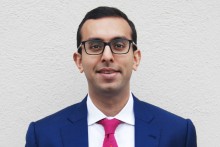Romulus Revs Up $75M Fund: Drones, VR Startups Need Not Apply

If you want to know what’s hot in the startup world, talk to venture capitalist Krishna Gupta. But odds are, he’s not investing in those types of companies. And for good reason: they’re overhyped.
Gupta (pictured) is the founder and general partner at Romulus Capital, a Boston-area venture firm that is announcing a new $ 75 million fund today. The firm has had a meteoric rise, from raising a sub-$ 1 million fund in Gupta’s MIT dorm room in 2008, to raising a $ 50 million fund two years ago, to now.
The new fund’s investors include three royal families and the largest conglomerate in China, Gupta says. Roughly half the investors are from the U.S., and the other half come from about 15 countries. Romulus now has $ 150 million under management, he says, counting several “special purpose vehicles”—separate limited partnerships raised to fund specific companies.
Like a lot of VCs, Gupta likes to zig when others zag. Hence his skepticism that frothy technologies such as drones and virtual reality are ready for prime time. “We don’t like betting, we like building,” he says. “We have to be able to engineer the growth of the business.”
For similar reasons, Gupta hasn’t invested in self-driving vehicles (“it’s capital intensive”) or cybersecurity (“we’re not particularly savvy, and we don’t like very crowded spaces”).
What Romulus does seem to like is “the interface between human psychology and machine learning,” Gupta says. “That’s the next stage of A.I.—[computers] have to feel and think like a human.” The firm’s relevant portfolio companies include Humanyze, Cogito, and Ginger.io. But Gupta notes that he’s not a fan of startups that are based on chatbots, computer programs that can converse with people.
Romulus has tended to focus on business-to-business companies, as compared to consumer tech. Some examples in its portfolio are in traditional industries like marketing (E la Carte), construction (EquipmentShare), real estate (Placester), and healthcare (Allurion, Cohealo, MHB Labs). Gupta says that focus will continue with the new fund, along with its focus on leading seed and Series A rounds.
Geographically, Romulus has made investments primarily in the Boston area, the Bay Area, and other parts of the U.S. But it does take a global view, Gupta says, and is about to close an investment in a biotech company based in India.
Romulus faces plenty of competition from established venture firms and upstarts. In the Boston area, new early-stage tech funds include Pillar, led by former North Bridge partner Jamie Goldstein; Assemble.VC, led by Michael Skok, John Pearce, and C.A. Webb; Hyperplane Venture Capital, led by Vivjan Myrto; and Glasswing Ventures, led by former Fairhaven VCs Rick Grinnell and Rudina Seseri.
A broader theme in venture capital is that firms and partners are trying to align themselves better with entrepreneurs. There’s more transparency in the funding process than there used to be, and young startups have more options than ever.
Gupta doesn’t seem worried about alignment—or the competition. “Entrepreneurs look us in the eye and see entrepreneurs, not former entrepreneurs,” Gupta says. He’s referring to other VC firms whose partners used to lead startups. He claims Romulus is now the largest venture fund in the world run by under-30-year-old partners. (Gupta is 28, and his partner Neil Chheda is 29.)
As Gupta sees it, raising a big fund and knowing how to deploy it require two different skill sets. And few people can do both well. “Now, so many funds have popped up,” he says. “The question is, do they actually have the ability and respect to lead, and add value?
The same question could be asked of Romulus, of course. The firm is at an enviable stage where it’s too early to judge by its exits—Crocodoc being acquired by Box is one—but not too early to look at its track record of making about 30 investments so far.
Gupta says about one-third of the firm’s investments from its first fund are in companies that will make $ 15 million or more in revenue this year and are cash-flow positive. He also says Romulus prefers to hold onto its investments, versus cashing out in later-stage venture rounds. Given its relatively small deal sizes, the firm seems content to see how its companies play out over the next few years.
“We don’t need billion-dollar exits,” Gupta says.
(18)













